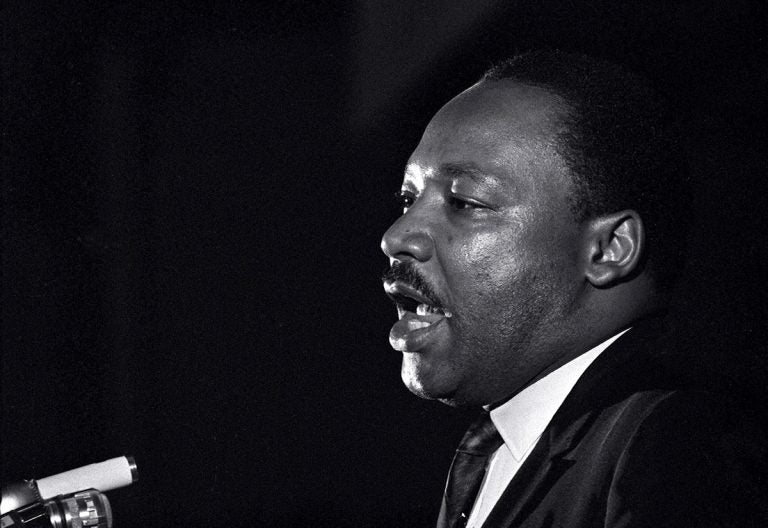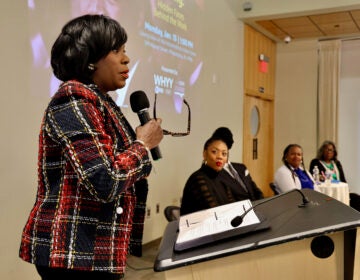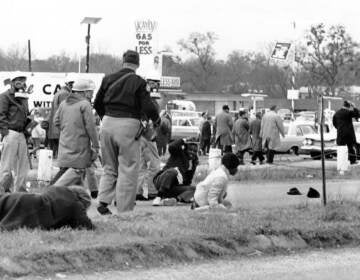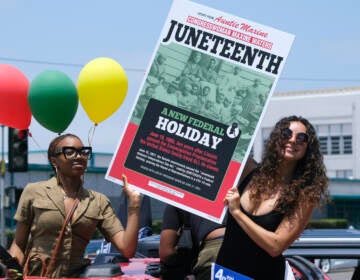King’s final speech ‘transformational’ for Philadelphia pastor
Bishop J. Louis Felton thinks about Dr. Martin Luther King, Jr. every day. That’s been especially true this week.

In this April 3, 1968 file photo, Dr. Martin Luther King Jr. makes his last public appearance at the Mason Temple in Memphis, Tenn. The following day King was assassinated on his motel balcony. (Charles Kelly/AP Photo, File)
Bishop J. Louis Felton thinks about Dr. Martin Luther King, Jr. every day. That’s been especially true this week.
Today marks the 50th anniversary of King’s assassination in Memphis. Felton traveled there from Philadelphia to commemorate the infamous day with a group of preachers from around the country. He called a reporter the night before the anniversary while standing outside Mason Temple, where, as an 11 year-old, he watched with his father as King delivered his “Mountaintop” speech – what would be the civil rights legend’s final speech before being fatally shot the next day.
“I’ve seen the promised land. I may not get there with you, but I want you to know tonight that we, as a people, will get to the promised land,” King told the audience during the April 3 speech.
Felton, who leads Mt. Airy Church of God in Christ in West Oak Lane, said he’s never forgotten King’s words from that night a half-century ago. His “masterful eloquence” is one reason. But Felton also vividly recalls listening to a man living under the threat of death from those who opposed his dream of racial equality in America.
“He knew that God’s grace had extended his life, but that the time was near. He felt it. And we could feel it that night,” said Felton.
It transformed him.
It’s why he plunged himself into ministry.
It’s why he continues to fight against racism.
It’s why he preaches about uniting people the way King did.
“King had a way of bridging that divide, but the divide is an even greater chasm now than it was then,” said Felton.
Fifty years after King’s death, Felton said the key to building a consensus around some of today’s social justice issues – healthcare, immigration, gun violence – is to follow King’s footsteps. First, by bringing religious leaders together, have them extend the metaphorical olive branch to the other side.
“King was able to get Jews, Christians, Muslims, together around this principle of freedom and justice for all citizens,” said Felton.
To Felton, it’s also important to take a page out of King’s playbook and get young people involved. That is growing in importance now that it’s 50 years since King’s death. With so many years passed, a huge portion of the population now has no direct memory of the civil rights leader, only hearing about him second-hand.
Felton said it’s been encouraging to watch so many students stand up and fight for stricter gun control laws following the mass shooting at Marjorie Stoneman Douglass High School in Parkland, Florida.
“A new generation, many of whom can’t even vote, are now holding politicians’ feet to the fire who won’t take a stand on the safety of children’s lives,” said Felton.
In a small way, it reminds him of being that 11-year-old boy in the Civil Rights Movement, fighting for equality, a better country. The one King died trying make a reality.
WHYY is your source for fact-based, in-depth journalism and information. As a nonprofit organization, we rely on financial support from readers like you. Please give today.





